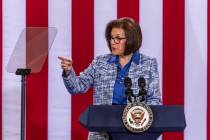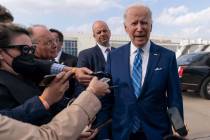Domestic partner benefits
For more than a year, officials from Nevada's higher education system have argued that their ability to attract and retain top academics has been compromised by the state's refusal to offer taxpayer-subsidized health insurance to domestic partners.
The policy would extend public employees' generous benefits to unmarried opposite-sex couples as well as same-sex partnerships. And it would reach beyond the university system to all state employees, from DMV clerks to Highway Patrol troopers.
That won't come cheap. No one can say for certain how much additional funding the already-unstable program might need to expand its risk pool; the Public Employees Benefits Program Board has been told it would cost more than $4 million to cover the first year.
Alas, now is not the time for state agencies and programs to seek funding enhancements. Gov. Jim Gibbons and lawmakers already have cut about $1 billion from the current two-year budget because of revenue shortfalls, and Gov. Gibbons plans to present the 2009 Legislature with a zero-growth spending plan for the coming biennium.
On Thursday, the PEBP Board voted 6-2 to delay the introduction of the benefit until better economic times.
The action was especially disappointing to University of Nevada, Reno professor Jim Richardson, a representative of the Nevada Faculty Alliance -- not just because of the vote to delay, but because board members approached the problem of funding the policy with blinders on. They assumed that only money pulled from the wallets of taxpayers can cover the bill.
If, in fact, extending health insurance to domestic partners is essential to maintaining a high-quality state government work force, why can't public employees themselves cover the costs through increased premiums?
Board member Jacque Ewing-Taylor asked how much it would cost the program to offer health benefits to same-sex partners only.
The answer: an estimated $1.5 million per year, or just $4.50 per month in increased premiums per plan participant.
"I would be more than happy for my premium to go up by four and a half dollars a month in order to cover this group," Ms. Ewing-Taylor said. "I maintain this is something we need to do for equity's sake."
Unfortunately, most public employees do not share Ms. Ewing-Taylor's enthusiasm for making nominal sacrifices in tough times. Most private-sector workers are seeing their premium costs increase for unchanged or reduced health insurance benefits. Now they're supposed to provide public servants, who already enjoy superior pay and benefits, with even more goodies?
This isn't about denying recognition to gay marriages. The state shouldn't be in the business of regulating marriage in the first place.
This is about making government employees, the highest-paid sector of the state's work force, pay their own way if they want new perks.























